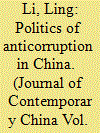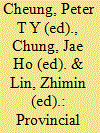|
|
|
Sort Order |
|
|
|
Items / Page
|
|
|
|
|
|
|
| Srl | Item |
| 1 |
ID:
163412


|
|
|
|
|
| Summary/Abstract |
This article traces the process of Xi Jinping’s campaign in 2012–2017 and explains how an anticorruption effort has been transformed into an exercise of power-consolidation for his office. The findings of this article are three-fold. First, the power-consolidation process has benefited from a combination of an ideological campaign and a disciplinary campaign, which were not only synchronized but also feed into one another to achieve a shared goal. Second, the campaign became politicized around midterm and intensified afterwards. The pace of progress of the campaign coincided with Xi Jinping’s advancement of power. Third, the most significant outcome of Xi Jinping’s campaign is not the numbers of disciplined corrupt officials but the paradigm-change in the disciplinary regime of the Party: first, the reversal of the depoliticization process of the Party’s disciplinary regime; second, the retention of temporarily mobilized anticorruption resources; and third the simplification of evidence production procedure. The combined result is a considerable expansion of the CCDI’s anticorruption investigative capacities and a significant increase Xi Jinping’s leverage to impose political loyalty and compliance upon Party officials in the future.
|
|
|
|
|
|
|
|
|
|
|
|
|
|
|
|
| 2 |
ID:
064966


|
|
|
|
|
| Publication |
London, M E Sharpe, 1998.
|
| Description |
466p.
|
| Series |
Studies on contemporary China
|
| Standard Number |
0765601478
|
|
|
|
|
|
|
|
|
|
|
|
Copies: C:1/I:0,R:0,Q:0
Circulation
| Accession# | Call# | Current Location | Status | Policy | Location |
| 050092 | 338.951009049/CHE 050092 | Main | On Shelf | General | |
|
|
|
|
| 3 |
ID:
163411


|
|
|
|
|
| Summary/Abstract |
In five years, Xi Jinping transformed both domestic and external policies of China to become the only leader after Deng Xiaoping to radically alter internal political landscape and external relations during his first term in office. Chinese leaders from Mao down tended to render foreign policy to a role of a second fiddle in their overall scheme of governing. Xi, however, for reasons that will be explored in this article, has shown determination and confidence to recast this traditional delineation in favor of a more integrated approach. In doing so, Xi has managed to pursue a far more assertive diplomacy. To help understand how Xi managed to carry out his brand of “major country diplomacy” (大國外交), the article uses a modified model based on Joel Migdal’s state capacity theory. Through a largely populist and nationalist ideology wrapped in globalist rhetoric, institutional revamp and innovation, mobilization of resources, implementation with discipline, risk-taking but skillful leadership while taking advantage of “world historical timing,” Xi was able to build a much stronger diplomatic capacity. However, Xi’s “major country diplomacy” is not without problems and challenges. The prospect of China becoming a true global power is far from certain.
|
|
|
|
|
|
|
|
|
|
|
|
|
|
|
|
|
|
|
|
|